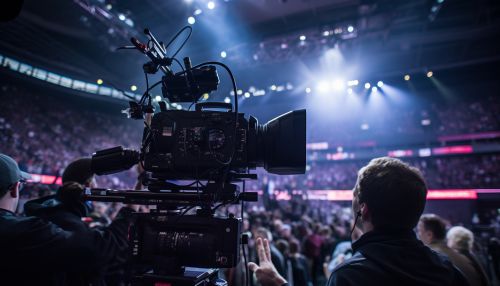Reality Television
Overview
Reality television is a genre of television programming that documents purportedly unscripted real-life situations, often featuring unknown individuals rather than professional actors. Reality television came to prominence in the late 20th century and became a significant part of the television landscape.
History
The origins of reality television date back to the early days of television itself. In the 1940s and 1950s, the broadcast networks began to experiment with shows that featured real people in unscripted situations. These early reality shows were often based on popular radio formats, such as "Candid Microphone" which became "Candid Camera" on television.


The 1970s saw the first wave of reality television shows that focused on the personal lives of ordinary people. The most notable of these was "An American Family," a PBS series that documented the lives of the Loud family over a period of seven months. This series is often cited as the first "reality show," although the term was not yet in use.
The genre gained more prominence in the 1990s and 2000s with the success of shows like "Survivor," "Big Brother," and "The Amazing Race." These shows introduced competitive elements and game show-like formats that have become staples of the genre.
Types of Reality Television
Reality television can be divided into several sub-genres, each with its own conventions and formats.
Documentary-Style
Documentary-style reality television shows focus on the real-life situations and personal dramas of their subjects. Examples of this style include "The Real World," "Keeping Up with the Kardashians," and "Duck Dynasty."
Competition/ Game Shows
Competition or game show-style reality television programs involve contestants competing against each other for a prize. These shows often involve elimination rounds, with one or more contestants being removed from the competition in each episode. Examples of this style include "Survivor," "The Amazing Race," and "The Bachelor."
Self-Improvement/ Makeover
Self-improvement or makeover reality shows involve participants being given the chance to change their lives or appearances with the help of experts. Examples of this style include "The Biggest Loser," "Extreme Makeover: Home Edition," and "Queer Eye."
Dating Shows
Dating reality shows involve participants going on dates or participating in activities to find a romantic partner. Examples of this style include "The Bachelor," "Love Island," and "First Dates."
Impact and Criticism
Reality television has had a significant impact on popular culture and has been the subject of much criticism. Critics argue that reality television is not truly "real" and that the situations are often staged or manipulated for dramatic effect. There is also concern about the impact of reality television on the individuals who participate in these shows, particularly in terms of their privacy and mental health.
Despite these criticisms, reality television remains popular with audiences and continues to be a significant part of the television landscape.
